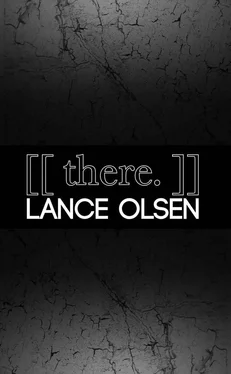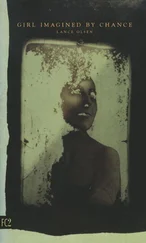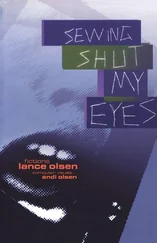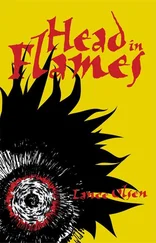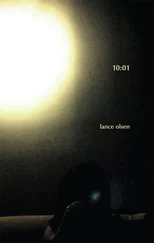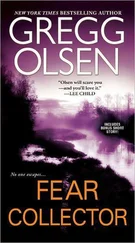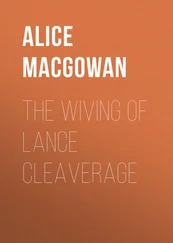Walking through a metal detector at an airport one day, she sets off the alarm. A visit to the doctor reveals someone has implanted a chip used to track endangered species in her abdomen. Like Gregor Samsa, she abruptly becomes exiled from her own body. The story concludes with the narrator reporting she has taken to living in airports, which for her represent atemporal, non-spatial realms that make her feel safe, as if she is both everywhere and nowhere — the Ur-experience for all travelers.
All three narratives are interrupted briefly, once, by a screen-sized smiley face clock, while an upbeat jazz score at odds with the narratives’ content plays throughout.
:::: In Venezuela our maid decapitated live chickens on the way to our dinner table by forcing their squawking heads down the garbage disposal.
The grinding. The bloody feathers.
:::: Young-Hae Chang is a Korean artist with a Ph.D. in aesthetics from Université de Paris. Heavy Industries is one other person: Marc Voge.
We changed Marc into Heavy Industries, Chang explains in an interview, because Koreans love big companies and Marc doesn’t mind being objectified and capitalized on.
They hardly ever do interviews. When they do partake, they generate wide-eyed doubletalk.
Andy Warhol: hello.
Guten Tag, cosmopolitan interchange among the arts.
:::: Because people still read books on trains in Berlin. Fat books. O. can’t make out the titles, but the very fact makes him secretly happy.
Several nights ago the filmmaker Su Friedrich revealed to him over dinner this is no longer the case in New York. Everyone on the subway is thumbing his or her smart phone or iPad or iPod instead.
You don’t know what those around you are reading, she said. You no longer have any idea who forms the community in which you’re traveling. Fuck that.
:::: Our cultural retreat from narrative. Our cultural addiction to narrative.
:::: I am at war with myself.
Admitted Derrida.
:::: Sixty-two years after those people gathered in Opernplatz to watch books burn, Micha Ullman’s memorial commemorating the event was inaugurated. You have to hunt for it: a two-and-a-half-foot by two-and-a-half-foot piece of hazy Plexiglas set into the cobblestones of the square. Look through, and you will see a ghostly library below: a large white room filled with entirely empty white bookcases reminding you what was lost that couldn’t be lost.
:::: Next to the Plexiglas window, a brass plaque in German: This was only foreplay. Where they burn books, they will also burn people.
A quote by Heinrich Heine.
From 1821.
:::: Wandering through what had once been an orchard in Choeung Ek about 10 miles south of Phnom Penh, I start noticing shreds of material wisping out of the dried mud around my feet and realize we are walking on top of some of the 8,895 people murdered here by the Khmer Rouge.
To save bullets, they smashed babies’ and children’s heads against the surrounding trees.
:::: When the child was a child, the angel Damiel writes in his diary, it was the time of these questions: Why am I me, and why not you? Why am I here, and why not there?
:::: N. Katherine Hayles highlights the importance of Media Specific Analysis when approaching any text. We’ve been raised on hardcopy data delivery systems that have remained virtually unchanged in appearance for 500 years. As new paginal and surpaginal forms emerge, it is essential to employ a mode of critical attention which recognizes that all texts are instantiated and that the nature of the medium in which they are instantiated matters.
How a text matters mattering.
:::: How can it be that I, who am I, wasn’t before I was, and that sometime I, the one I am, no longer will be the one I am?
:::: During the autumn of our second year in Lexington, Andi came across the following in a local greensheet: FOR SALE: Remote cabin on 15 acres, Red River Gorge. Cliffs, caves, waterfalls. 1000 sq. ft., 2 BR, electricity. Great for relaxing, hiking, writing. Under $12,000. We drove out the next weekend to have a look. Remote was 70 miles to the east, in Meniffee county, first on a highway, then a series of winding and increasingly hilly, woody back roads through towns with names like Camargo and Grants Lick. Past fields of yellow-green tobacco and the Primitive Baptist Church, which was no larger than a sagging garage, and past the Lucky Stop Pentacostal Barn, which doubled as a used-car lot, and past block letters in white paint on the side of another gray barn that spelled SECULAR HUMANISM IS THE DEVIL’S WORK, then into and out of the last town, Frenchburg, which consisted of a Methodist church, a Piggily Wiggily Food Mart, a post office, and Mom’s Kuntry Kitchen.
:::: If I got bad marks or did something bad, my mother would say: It’s a pity that I got out of Auschwitz to experience that.
Related Yaakov Gilad, whose mother also survived Majdanek and Neustadt-Glewe.
:::: In the absence of metanarratives, Lyotard says, we must become alert to difference, the absolute incompatibility of our beliefs and desires with those of others. When we converse with someone else, we enter into a network of language games, aware of the innumerable systems in which meanings are produced and rules for their circulation created. One might argue that such relativism gives the lie to the possibility of an ethics, but for Lyotard injustice simply means the imposition of one set of language games on another. Ethical behavior amounts to allowing multiple language games to be played simultaneously, to a commitment to keep playing.
Murder is unethical, not because it takes a life, but because it violently terminates the possibility of conversations that are and should be unresolvable.
:::: The first thing I saw as I stepped off the train from Helsinki to St. Petersburg was a cop hitting a man in the back of the legs with a billy club. The man would crumple to his knees, raise his hands in supplication. The cop would order him to his feet again, then hit him in the back of the legs. Down the man would go.
This skit lasted at least for the length of time it took Andi and me to walk from one end of the platform to the other. People curved around the couple so as not to disturb their dance, pretending nothing was out of the ordinary, which in a sense was the case.
:::: The dominant systems of education are based on three assumptions that are exactly opposite to how human lives are actually lived, educationist Ken Robinson maintains. First, they promote standardization and a narrow view of intelligence when human talents are diverse and personal. Second, they promote compliance when cultural progress and achievement depend on the cultivation of imagination and creativity. Third, they are linear and rigid when the course of each human life, including yours, is organic and largely unpredictable.
:::: When I was 15, Himmler’s great niece Katrin recounted, one of my classmates asked me in the history lesson whether I was in fact related to that Himmler. I said yes with a lump in my throat. It went so quiet in the classroom you could hear a pin drop.
But the teacher became nervous and carried on as if nothing had happened.
:::: Just as the actualization of Danielewski’s House of Leaves could not have been imagined without the ubiquity of hypertext after 1990, the Web after 1993, and the new layout software to which Danielewski had access as he constructed his novel on the page, so too Chang’s Traveling to Utopia could not have been imagined except as a reaction to and conversation with conventional linear narrativity and hypertextuality, the ubiquity of film, and the Flash technologies which enable it.
Chang’s film-text instantiates the book’s disembodiment while placing the reader/viewer in the same position as the narrator(s) with respect to technology: unable to control it even as it broadcasts from both inside and out.
Читать дальше
